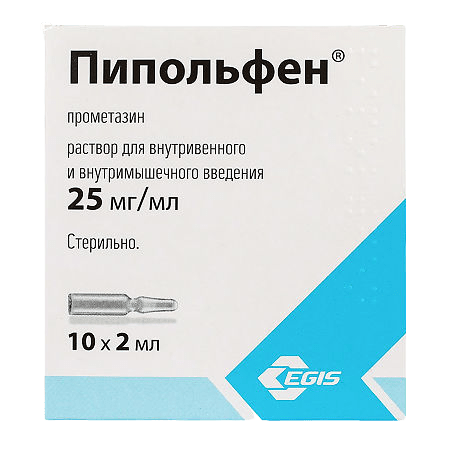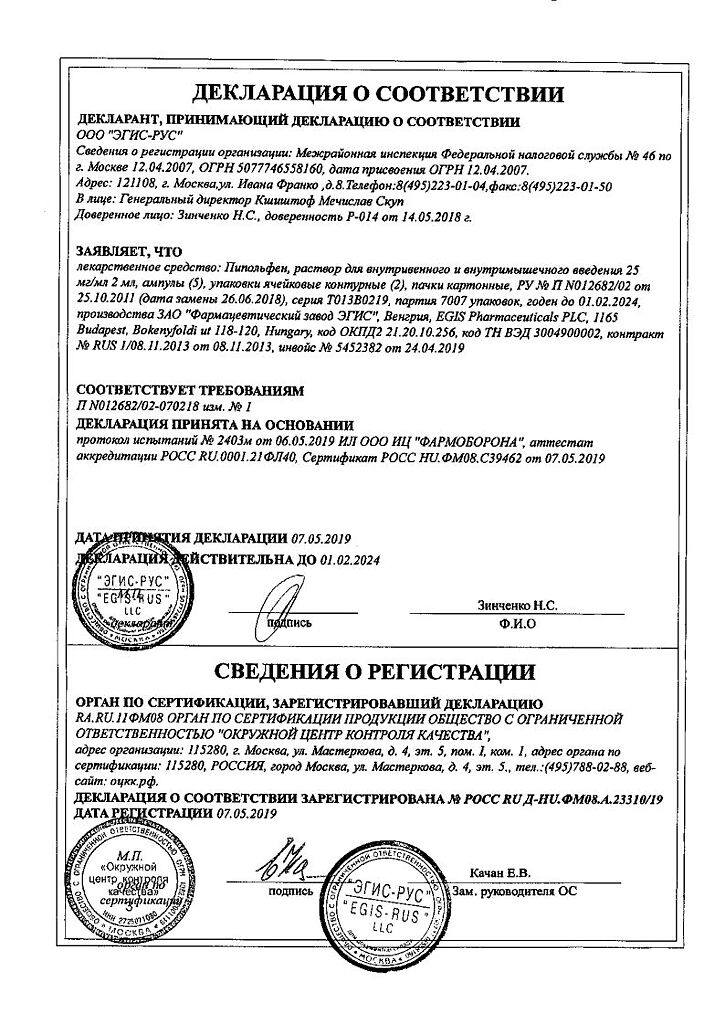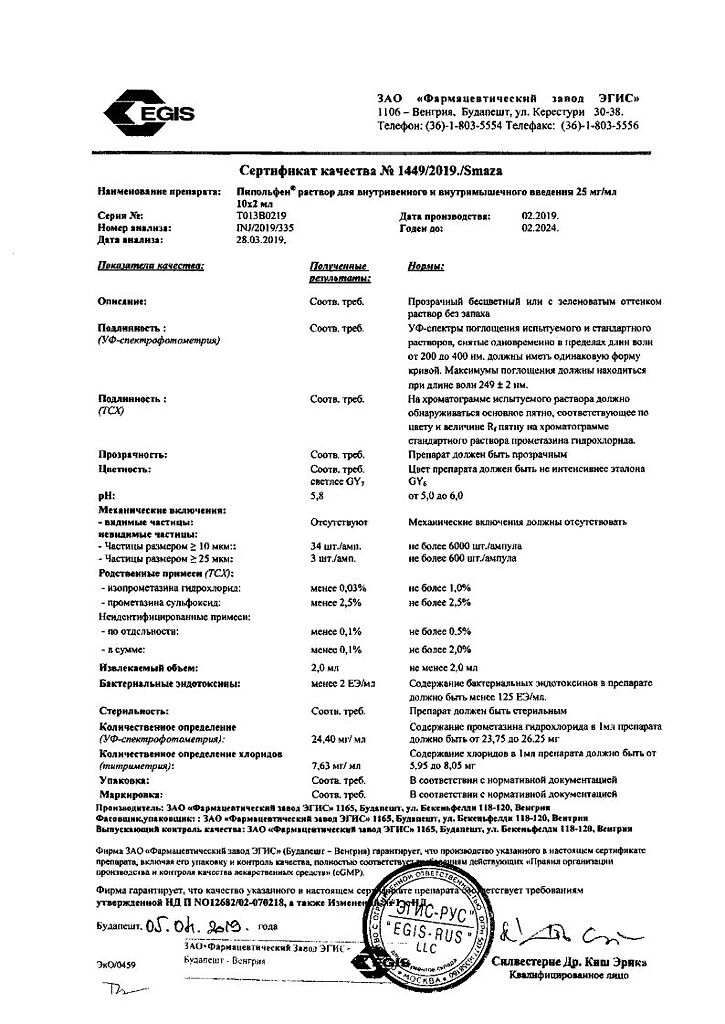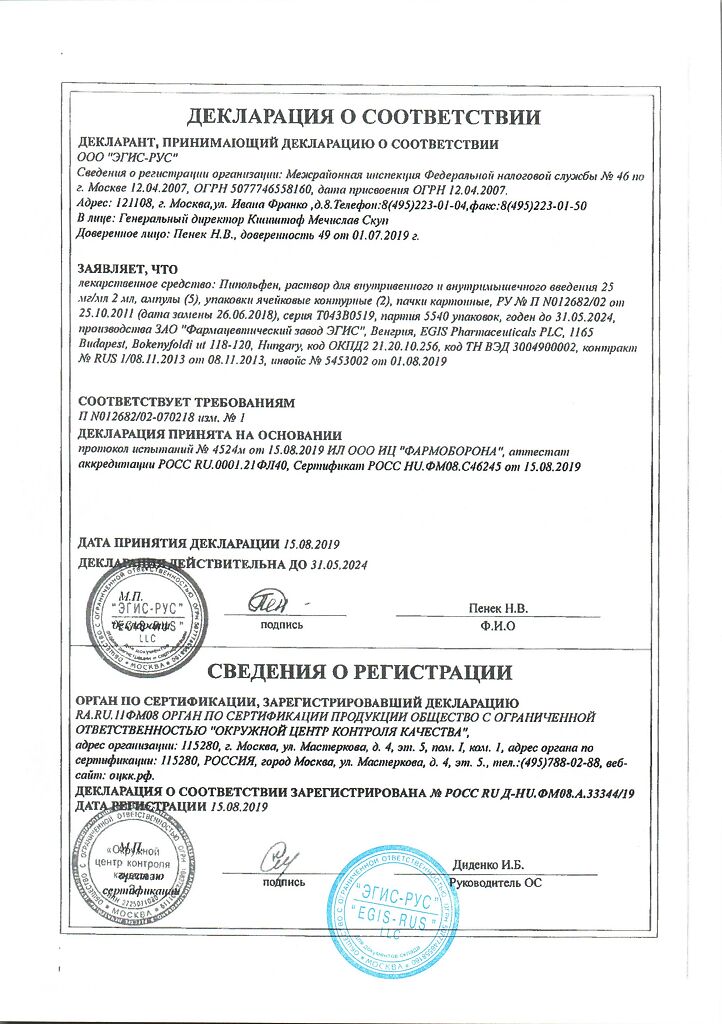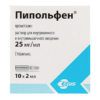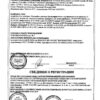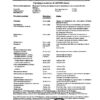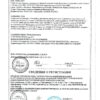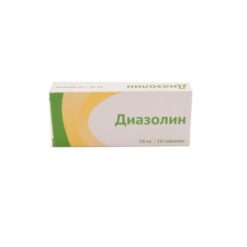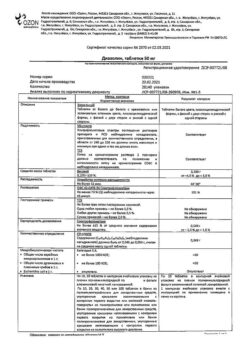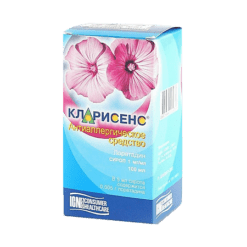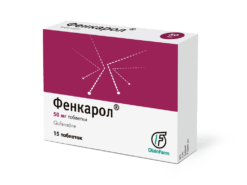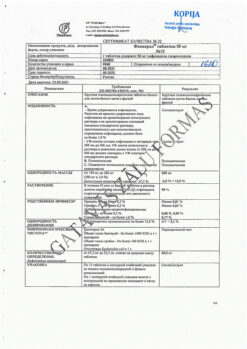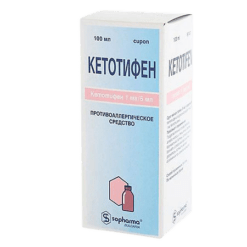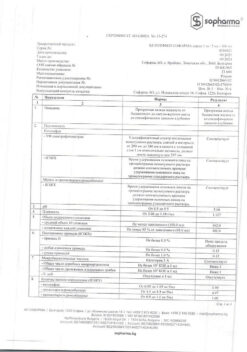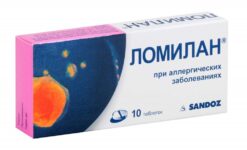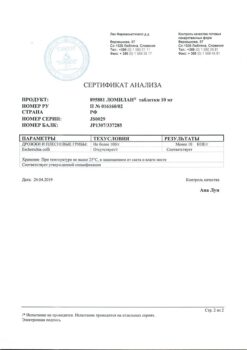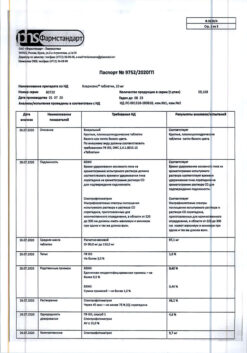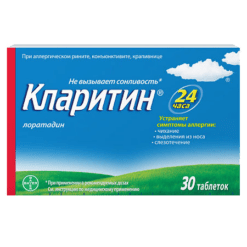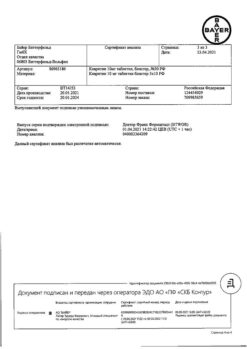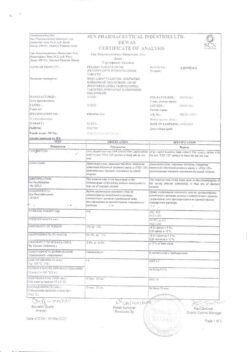No products in the cart.
Description
Pharmgroup:
Histamine H1-receptor blocker. Antiallergic drug.
Pharm Action:
Pipolphen is a blocker of histamine H1-receptors, a phenothiazine derivative. It has pronounced antihistamine activity and has a significant effect on the CNS (has sedative, hypnotic, antiemetic, antipsychotic and hypothermic effects). It prevents and calms hiccups.
Prevent histamine-mediated effects (including urticaria and itching). Anticholinergic action causes a drying effect on the mucous membranes of the nose and mouth.
The antiemetic effect of promethazine is due to its central anticholinergic effect, decrease in excitability of the vestibular system, suppression of labyrinth function and direct inhibitory effect on trigger chemoreceptor areas of the medulla oblongata.
The sedative effect is due to inhibition of histamine-K-methyltransferase and blockade of central histamine receptors. Blockade of other CNS receptors such as serotonin and choline receptors is also possible; stimulation of α-adrenoreceptors indirectly attenuates brainstem reticular formation stimulation. Because its chemical structure is different from that of other phenothiazine antipsychotics, promethazine has a weaker antipsychotic effect.
In therapeutic doses, it has no effect on the cardiovascular system.
The clinical effects appear 20 min after ingestion (15-60 min on average), 2 min after IUI or 3-5 min after IUI and usually last for 4-6 h (sometimes persisting up to 12 h).
Indications
Indications
Allergic diseases, including urticaria, serum sickness, hay fever, rhinitis, conjunctivitis, angioedema, itching;
Adjuvant therapy for anaphylactic reactions (after relief of acute manifestations by other means, for example, adrenaline);
As a sedative in the pre- and postoperative period;
Nausea and vomiting associated with anesthesia and/or appearing in the postoperative period (for prevention and relief);
Postoperative pain (in combination with analgesics);
Dizziness and nausea while traveling by transport (for prevention and elimination);
Strengthening the effect of analgesics, anesthetics (to potentiate anesthesia).
Pharmacological effect
Pharmacological effect
Pharmaceutical group:
Histamine H1 receptor blocker. Antiallergic drug.
Pharmaceutical action:
Pipolfen is a histamine H1 receptor blocker, a phenothiazine derivative. It has pronounced antihistamine activity and has a significant effect on the central nervous system (has sedative, hypnotic, antiemetic, antipsychotic and hypothermic effects). Prevents and soothes hiccups.
Prevents histamine-mediated effects (including urticaria and pruritus). The anticholinergic effect causes a drying effect on the mucous membranes of the nose and mouth.
The antiemetic effect of promethazine is due to its central anticholinergic effect, a decrease in the excitability of the vestibular system, suppression of labyrinth function, as well as a direct inhibitory effect on the trigger chemoreceptor zones of the medulla oblongata.
The sedative effect is due to inhibition of histamine K-methyltransferase and blockade of central histamine receptors. It is also possible to block other CNS receptors, such as serotonin and cholinergic receptors; stimulation of α-adrenergic receptors indirectly weakens the stimulation of the reticular formation of the brain stem. Because its chemical structure is different from that of other phenothiazine antipsychotics, promethazine has a weaker antipsychotic effect.
In therapeutic doses it does not affect the cardiovascular system.
The clinical effect appears 20 minutes after oral administration (on average 15-60 minutes), 2 minutes after intramuscular administration or 3-5 minutes after intravenous administration and usually lasts for 4-6 hours (sometimes lasting up to 12 hours).
Special instructions
Special instructions
With long-term use of the drug, it is necessary to systematically monitor the peripheral blood count and liver function.
With extreme caution, especially in high doses, Pipolfen should be prescribed to elderly patients, because This category of patients has an increased risk of developing side effects.
When used simultaneously with Pipolfen, analgesics and hypnotics should be prescribed in lower doses.
Pipolfen® should be used under strict medical supervision simultaneously with opioid analgesics, sedatives and hypnotics, anesthetics, tricyclic antidepressants and tranquilizers.
Pipolfen® may mask the ototoxic effect (tinnitus and dizziness) of co-administered medications.
Pipolfen® reduces the seizure threshold. This should be taken into account when prescribing the drug to patients prone to developing seizures, or simultaneously with other drugs with similar effects.
As an antiemetic drug, Pipolfen® should be used only for prolonged vomiting of known etiology.
With long-term use, the risk of developing dental diseases (caries, periodontitis, candidiasis) increases due to a decrease in salivation.
During the treatment period, alcohol consumption is prohibited.
While taking Pipolfen, a diagnostic pregnancy test may give a false positive result.
A possible increase in blood glucose levels in patients taking Pipolfen® should be taken into account when performing a glucose tolerance test.
To prevent distortion of the results of skin prick tests for allergens, the drug must be discontinued 72 hours before allergy tests.
Each tablet contains 95 mg of lactose, which should be taken into account if you are lactose intolerant.
Use in pediatrics
Pipolfen® should be prescribed to children with caution, since this makes it difficult to diagnose the underlying disease. Symptoms of undiagnosed encephalopathy and Reye’s syndrome may be mistaken for side effects of Pipolphen.
Impact on the ability to drive vehicles and operate machinery
During the initial period of using Pipolfen, it is necessary to refrain from driving vehicles and engaging in other potentially hazardous activities that require increased concentration and speed of psychomotor reactions. In the future, the degree of restrictions is determined depending on the patient’s individual tolerance.
Active ingredient
Active ingredient
Promethazine
Composition
Composition
Each 2 ml ampoule contains 50 mg of the active substance – promethazine hydrochloride.
Excipients: hydroquinone 0.4 mg, potassium disulfite 1.5 mg, sodium sulfite anhydrous 2 mg, sodium chloride 14 mg, water for injection up to 2 ml.
Pregnancy
Pregnancy
There are no clinical data on the use of the drug during pregnancy. Therefore, it is not recommended to take the drug during pregnancy.
When taking the drug during lactation, the issue of stopping breastfeeding should be decided, due to the risk of extrapyramidal disorders in the child.
Contraindications
Contraindications
Hypersensitivity to phenothiazines or any other component of the drug,
comatose states or other types of profound depression of the central nervous system;
simultaneous use of MAO inhibitors and within 14 days after completion of their use;
alcohol intoxication, acute intoxication with sleeping pills, narcotic analgesics;
angle-closure glaucoma;
sleep apnea syndrome;
occasional vomiting in children of unspecified origin;
pregnancy and lactation (no clinical data);
children up to 2 months old.
WITH CAUTION
Acute and chronic respiratory diseases (due to suppression of the cough reflex), open-angle glaucoma, bone marrow suppression, cardiovascular diseases, liver and/or kidney dysfunction, peptic ulcer with pyloroduodenal obstruction, bladder neck stenosis and/or prostatic hypertrophy, predisposition to urinary retention, epilepsy, Reye’s syndrome, old age.
Side Effects
Side Effects
From the side of the central nervous system: sedation, drowsiness, nightmares, increased frequency of night apnea, impaired visual acuity, anxiety, psychomotor agitation, dizziness, confusion, disorientation; after taking in high doses – extrapyramidal disorders, increased convulsive activity (in children).
From the cardiovascular system: possible decrease in blood pressure, tachycardia, bradycardia.
From the digestive system: possible nausea, vomiting, constipation, dry mouth, nose, pharynx, anesthesia of the oral mucosa, cholestasis.
From the hematopoietic system: rarely – thrombocytopenia and/or leukopenia, agranulocytosis.
Dermatological reactions: skin rash and/or photosensitivity are possible.
From the senses: noise or ringing in the ears, accommodation paresis, visual impairment.
Allergic reactions: urticaria, dermatitis, photosensitivity, bronchospasm.
Other: increased sweating, difficult or painful urination.
Interaction
Interaction
Pipolfen® enhances the effects of opioid analgesics, hypnotics, anxiolytics (tranquilizers) and antipsychotics (neuroleptics), as well as drugs for general anesthesia, local anesthetics, m-anticholinergic drugs and antihypertensive drugs (dose adjustment required).
Pipolfen® weakens the effect of amphetamine derivatives, m-cholinomimetics, anticholinesterase drugs, ephedrine, guanethidine, levodopa, dopamine.
Barbiturates accelerate elimination and reduce the activity of promethazine.
Beta-blockers increase (mutually) the concentration of promethazine in the blood plasma.
Pipolfen® weakens the effect of bromocriptine and increases the concentration of prolactin in the blood serum.
Tricyclic antidepressants and anticholinergic drugs enhance the m-anticholinergic activity of promethazine.
Ethanol, clonidine, and antiepileptic drugs enhance the inhibitory effect of promethazine on the central nervous system.
MAO inhibitors (simultaneous administration is not recommended) and phenothiazine derivatives increase the risk of arterial hypotension and extrapyramidal disorders. Quinidine increases the likelihood of the cardiodepressive effects of promethazine.
Overdose
Overdose
Symptoms: in children – agitation, anxiety, hallucinations, convulsions, mydriasis and immobility of the pupils, flushing of the facial skin, hyperthermia; in adults – psychomotor agitation, convulsions, retardation. In case of acute overdose – a pronounced decrease in blood pressure, vascular collapse, respiratory depression, coma.
Treatment: due to the lack of antidotes, symptomatic and supportive therapy is carried out. Gastric lavage, administration of activated carbon orally (during detoxification in the early stages after ingestion); according to indications – antiepileptic drugs. Dialysis is ineffective. Ingestion of sodium or magnesium sulfate may have a beneficial effect.
Measures should be taken to restore adequate pulmonary ventilation by maintaining a patent airway and administering assisted or artificial ventilation. Correction of acidosis and/or electrolyte balance is necessary. For severe hypotension, norepinephrine (norepinephrine) or mesaton should be administered. Epinephrine (adrenaline) can paradoxically increase arterial hypotension.
Storage conditions
Storage conditions
List B. The drug should be stored in a place protected from light, out of reach of children at a temperature of 15° to 25°C.
Shelf life
Shelf life
5 years.
Manufacturer
Manufacturer
EGIS, Hungary
Additional information
| Shelf life | 5 years. |
|---|---|
| Conditions of storage | List B. The drug should be stored in the dark place out of the reach of children at 15° to 25°C. |
| Manufacturer | EGIS, Hungary |
| Medication form | solution |
| Brand | EGIS |
Related products
Buy Pipolfen, 25 mg/ml 2 ml 10 pcs with delivery to USA, UK, Europe and over 120 other countries.

